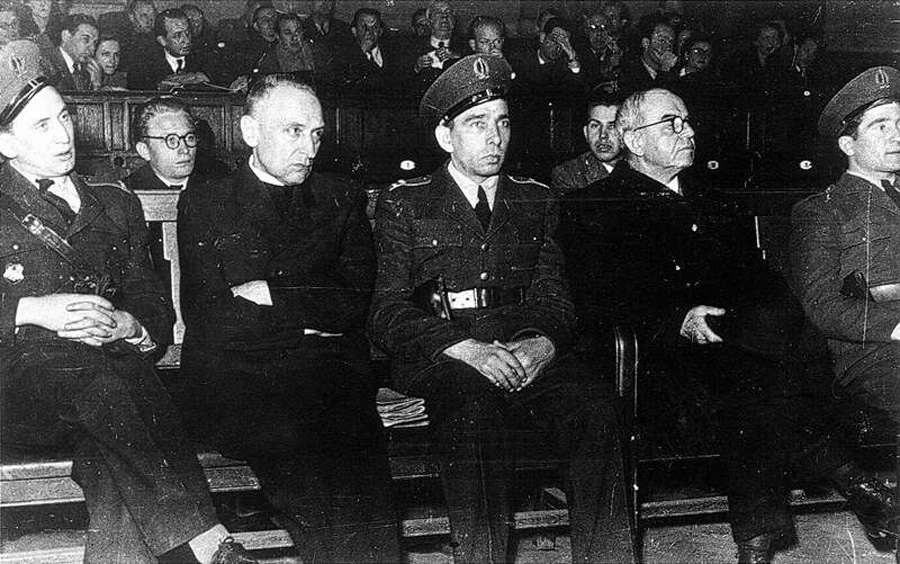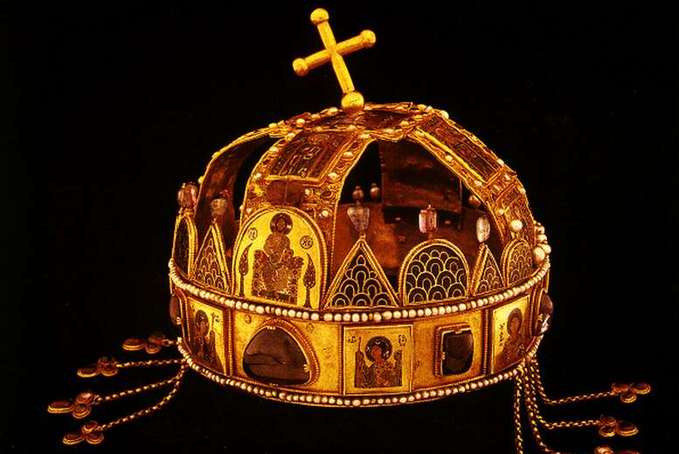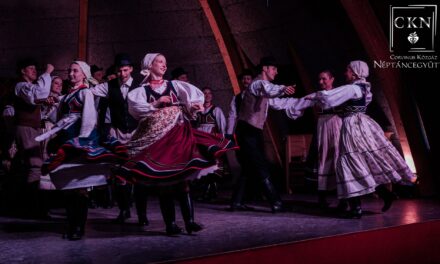On September 11, 1970, the American ambassador in Vienna telegraphed the Ministry of Foreign Affairs in Washington and the American embassy in Budapest about Cardinal König's request: if Alfred Puhan, the new Budapest ambassador, was in Vienna, he would like to speak with him.
König remained silent about what the subject of their discussion would be, but Humes believed that it might St. Stephen 's crown to the Vatican, which König repeatedly raised.
On September 14, William Pierce Rogers, , expressed his agreement from Washington that the resolution of the Mindszenty issue is a matter for the Budapest government, the Vatican and Mindszenty, which must be monitored from the American side. In the case of the Holy Crown, he referred to the Hillenbrand's August 11 instruction to his successor, Puhan
On October 20, Puhan reported on his trip to Vienna and his meeting with Archbishop König in a longer letter to Davies , who was the State Secretary of the Office of European Affairs at the State Department in Washington. König told him that he had mentioned the St. Stephen's crown to several Hungarian bishops, who all believed that it was in the Vatican. He also reported on his visit to the Holy Apostolic See, but he did not know what the idea was about the Holy Crown there. He asked Puhan if he had information about whether the apostolic delegate in Washington had approached the Ministry of Foreign Affairs in this matter.
Puhan knew of no such thing and informed König that any suggestion from the Vatican would be seriously studied. At the same time, he also pointed out that János Péter , in his stupid, offensive speech at the UN General Assembly, accused Washington of preparing to violate the Nuclear Non-Proliferation Treaty. After that, it is doubtful whether now is the right time to change the status of the Holy Crown: the Hungarians cannot wait for us to return it with good service. The archbishop understood this. König returned to the subject of the Holy Crown. He told me with great confidence and asked me not to name him in this context, but there is currently a Hungarian ecclesiastical delegation in the Vatican, where the matter of the Holy Crown may also be discussed.
Puhan presented the cardinal's new letter, dated October 13, 1970, to the Ministry of Foreign Affairs. In this year, the Trianon peace decree had been in force for half a century, and the impact of this and the newspaper reports was felt in the cardinal's letter for a reason.
"I confidently ask for your noble help because of the enormous danger threatening the holy crown of St. Stephen, which crown II. from Pope Sylvester before 1000. In 1945, the United States Army XII. Pope Pius , today's VI. Pope Paul , Rohracher of Salzburg, Cardinal Spellman , etc. through his intervention , he was protected in Wiesbaden, Germany, from the Russians and the robber Hungarian Bolsheviks.
He also signed, even as the bishop of Veszprém, he made no small efforts and distributed donations to several already impoverished aristocrats, my messengers. I asked that the crown be sent to the Holy Apostolic See, the original donor. But I was relieved when the Holy Crown and the coronation robes arrived in Washington.
This summer, the news from America and the wider world caused great fear, shock and scandal, when they suddenly reported that the relationship between the United States of America and (the traitor) Kádár is so excellent that - although not on August 20 of this year (Szent István on his holiday), but afterwards [Kádár] will definitely receive it. He doesn't ask for the coronation robes, just the crown. The American protest wave is well known.
I see the situation as very dangerous.
1.) In terms of both text and form, the statement from the United States of America is the most frightening on the matter. The press statement calls the Holy Crown a national treasure and property. This could be the start of legal proceedings regarding ownership.
However, Kádár and his system are not the same as the nation, but a traitor and a tool chosen by the aggressor Russia (UN Resolution 62 of 1957), although in 1963 the United Nations failed the nation and took the Hungarian issue off the agenda. I asked Mr. Dulles to make an effort to vote. He finds many allies among the new member nations. The peaceful coexistence consumed the Hungarian question along with many others. On less important issues, Mr. Dulles later scored excellent votes with many other member states.
Although the United States of America never demanded compensation for Kádár's expulsion of its ambassador and a fifth of the embassy's staff, Kádár received a huge honor with the establishment of the new embassy. The Hungarian nation ceased to exist at the diplomatic level.
2.) Kádár exerted enormous pressure on the Hungarian bishops' faculty, and they issued a joint pastoral letter for the feast of St. Stephen:
»The Holy Crown, which our people carefully guarded in the storms of a thousand years, and which they would still gladly guard today...«.
(Új Ember, August 16, 1970) If Kádár does not launch an attack on this issue, he will publish the relevant circular as an expression of public opinion. The pastor's letter with the name of Deputy State Secretary Montini The current Holy Father wrote letters on this matter and when the Russians, Rákosi and Kádár. They found these letters signed by Montini, they were angry with him and the Pope because of the Holy Crown.

Duke Primate József Mindszenty is the defendant in the concept trial. (Image: cultura.hu)
In addition to the nation and the Holy Crown, it also offends me in both my dignity and my person. When he was arrested and convicted in December 1948, in February 1949 Miklós Nyárádi, Hungarian Minister of Finance and President of the High Economic Council (1947–48), then and now in exile in Switzerland, declared: "It is my duty to reveal the historical background of this tragic case (the case of Cardinal Mindszenty).
In connection with the various accusations brought against the cardinal by the Hungarian government, I am in a position to say the following on a well-founded basis:
1.) The campaign to exterminate the Hungarian Catholic Church was wanted, decided and controlled by Moscow.
2.) The cardinal's position regarding the return of the Holy Crown , on which the accusation of a conspiracy to restore the Habsburg dynasty was based, coincided with the position of Hungarian politics on this issue.
3.) If the cardinal carried out transactions with foreign currencies, it was because, as primate, he acted in accordance with the privileges granted to him by the Hungarian government in these matters for the benefit of humanitarian philanthropic organizations and churches operating in the country.
At the time of this disclosure statement, I was on an official mission. Realizing that I could neither stop nor slow down this catastrophic process, and for economic and political reasons, on December 3, 1948, I decided to resign and not return to Hungary.«
This view was soon adopted by the communist members of the Hungarian government. In this way, how can anyone accuse Cardinal Mindszenty of behavior that is identical to the behavior of the government? How can anyone interpret this behavior as aggrieved when the citizen's position perfectly "coincided with the government's position." (NY Herald Tribune, October 11, 1949)
From all this it becomes clear that
1.) Stalin was my persecutor when Washington was deep in the Cold War.
2.) The destruction of the Catholic Church was planned.
3.) Rákosi and his Minister of the Interior, Kádár, invented a fairy tale: a coronation carried out by me in Rome, as if they were looking for and found a naive claimant to the throne who would be ready to come and be crowned, so that he would then become the eternal vassal of Stalin, Rákosi and Kádár. The only truth is that I wanted to save the Holy Crown from the enemy, which was also in great danger in 1945, just as it was during the first Bolshevism (1919), when Béla Kun made an offer to invited foreign buyers - mainly from the Netherlands. The offer was very low. The system crashed before the day of the second auction.
Kádár and his system are not grateful for the awards they received for free and undeservedly. On the contrary, it attacks the United States of America and the President personally. Please resist. If this is not possible, please, Mr. President, send the treasures to the Vatican according to the original idea. In this way, a life that Satan slanders does not become nothing. The Holy Crown would thus not become an award for the destruction of 2.5 million embryos (which is 1/4 of the unfortunate nation between 1947 and 1969)…”
The State Department rejected the cardinal's efforts on October 23. , the official of the Ministry of Foreign Affairs - John Alexander Baker , director of the Office of European Affairs of the United States Department of State - sent an instruction to Puhan: "if, as suggested in the last paragraph of my letter of October 9, the cardinal will recall the statutes to his memory - they wrote to Budapest - he could add, that we will not forward your messages that are not related to your shelter. […] We understand that the Cardinal is difficult to divert from his intention, and that he apparently refuses to restrict his correspondence.
It is obviously impossible for the cardinal to send a copy of his letter to the President about the crown to anyone other than the foreign minister among the representatives of the executive power. We do not forward such a letter under normal circumstances. We would appreciate it if you would reject this at the outset by pointing out that it is the President's job to decide with whom he shares his sensitive mail, and that the issue of the Cardinal's asylum is not the responsibility of anyone in the administration other than the Secretary of State. We hope you will be able to do this much, for we feel that you and we will liberally deal with the terms of the Cardinal's asylum by forwarding your letters to the President about his memoirs and the crown. We definitely don't want the Cardinal to start a wider correspondence. We will leave it to your discretion how to carry this out, knowing of course that you must continue to live with the Cardinal…”
Author: Zsolt Zétényi












